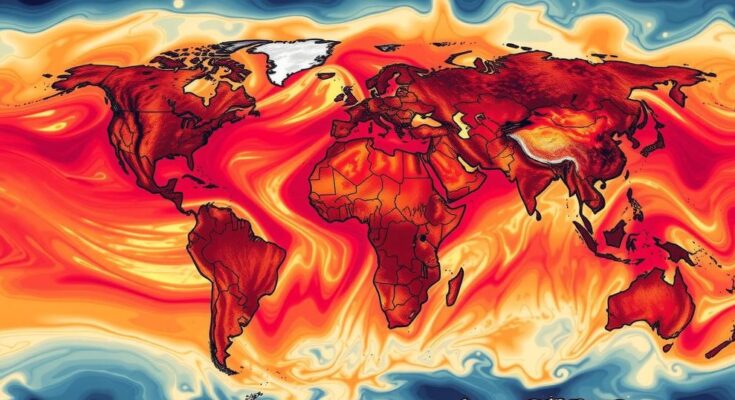In 2024, extreme weather events rose significantly due to record temperatures, causing severe heatwaves, droughts, floods, and more. A report by Climate Central indicated 41 additional days of global heat attributed to climate change, affecting vulnerable nations and intensifying health risks, while underscoring an urgent need to address emissions and move away from fossil fuels.
The year 2024 has witnessed an alarming surge in extreme weather events, attributed to unprecedented global temperatures. Despite beginning the year with a wave of cold weather, the year is predominantly characterized by severe heatwaves, droughts, wildfires, storms, and devastating floods that have resulted in substantial loss of life and displacement of millions. A recent analysis from Climate Central, a non-profit research organization, revealed that climate change has been responsible for an additional 41 days of extreme heat across the globe in the past year.
Small island nations and developing countries bore the brunt of these heat days, facing acute health risks that remain largely unreported. Notably, climate change has exacerbated the impact of the El Niño phenomenon on various disasters, most prominently the significant drought affecting the Amazon rainforest—a critical carbon sink that has endured immense biodiversity loss due to both drought and associated wildfires.
Flooding events impacted numerous countries, including Sudan, Brazil, Dubai, and regions within the Southern Appalachians. Of the 16 major flooding incidents analyzed by Climate Central, 15 were directly linked to increased rainfall driven by climate change. The lack of effective evacuation strategies and inadequate flood defenses further heightened the human cost.
The oceans, too, have absorbed additional heat, contributing to the intensification of destructive storms such as Hurricane Helene and Typhoon Gaemi. Research indicates that contemporary storms exhibit heightened intensity, with stronger winds and increased rainfall as a direct consequence of climatic warming. Furthermore, hurricanes in the Atlantic from 2019 to 2023 have demonstrated an increase of one category in strength due to human-induced climate factors. Climate Central underscores the pressing need for emissions reduction and a transition from fossil fuels to mitigate such disasters.
Climate change has emerged as a primary driver of extreme weather events, impacting global health, safety, and environmental stability. As average global temperatures continue to rise, the manifestation of these changes includes more frequent and severe natural disasters such as heatwaves, flooding, and storms. The role of human activity in exacerbating these conditions is increasingly evident, prompting scientific organizations like Climate Central to identify the connection between climate change and the frequency of disasters to advocate for urgent policy responses. Understanding the gravity of these issues is crucial in informing public and governmental actions towards sustainability and resilience in the face of a changing climate.
In conclusion, the dangers posed by climate change have become increasingly apparent, as evidenced by the record-breaking extreme heat days recorded in 2024 and their dire consequences. The analysis provided by Climate Central highlights the substantial contributions of human-induced warming to various catastrophic events around the globe. This situation reinforces the urgent call for immediate action in reducing emissions and transitioning to sustainable energy practices to mitigate ongoing and future environmental crises.
Original Source: www.energylivenews.com




